Barquisimeto
Nueva Segovia de Barquisimeto | |||
|---|---|---|---|
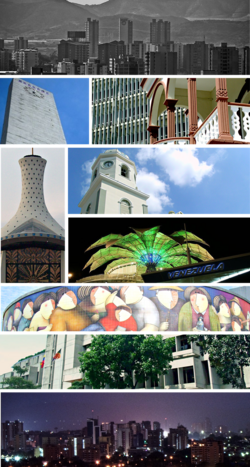 | |||
| |||
| Nickname(s): "Capital musical de Venezuela" (English: " Musical capital of Venezuela) " " Ciudad Crepuscular" (English: "Twilight City") | |||
 Nueva Segovia de Barquisimeto | |||
| Coordinates: 10°03′49″N 69°20′05″W / 10.06361°N 69.33472°W / 10.06361; -69.33472Coordinates: 10°03′49″N 69°20′05″W / 10.06361°N 69.33472°W / 10.06361; -69.33472 | |||
| Country | |||
| State | Lara | ||
| Municipality | Iribarren | ||
| Founded | 1552 | ||
| Founded by | Juan de Villegas | ||
| Government | |||
| • Mayor | Alfredo Ramos (La Causa Radical) | ||
| Area | |||
| • City | 276 km2 (107 sq mi) | ||
| • Urban | 194 km2 (75 sq mi) | ||
| Elevation | 566 m (1,857 ft) | ||
| Population (2016) | |||
| • Urban [1] | 930,000 | ||
| • Urban density | 4,800/km2 (12,000/sq mi) | ||
| • Demonym | Barquisimetano(a) | ||
| Time zone | UTC-4 (VST) | ||
| • Summer (DST) | UTC-4 (not observed) | ||
| Postal code | 3001 | ||
| Area code(s) | 0251 | ||
| Website | Local Government Website (in Spanish) | ||
| The area and population figures are for the municipality | |||
Barquisimeto (Spanish pronunciation: [baɾkisiˈmeto]) is a city in Venezuela. It is the capital of the state of Lara and head of Iribarren Municipality. It is an important urban, industrial, commercial and transportation center of the country, recognized as the fourth-largest city by population and area in Venezuela after Caracas, Maracaibo and Valencia.
Contents
1 History
1.1 Names and etymology
2 Religion
2.1 Divina Pastora
3 Geography
3.1 Neighboring municipalities
3.2 Large-magnitude earthquakes (Richter’s scale)
4 Climate
5 Education
5.1 Other universities and colleges
6 Hospitals
6.1 Private hospitals
6.2 Public hospitals
6.3 Gallery Images
7 Transportation
8 Sports
9 Notable People
10 See also
11 References
12 External links
History
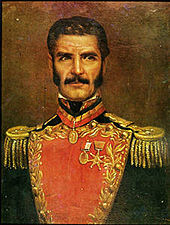
Jacinto Lara General.
Barquisimeto was founded in 1552 by Juan de Villegas, as a headquarters and to have better control of the territory believed to be rich in gold. Its original name was "Nueva Segovia de Barquisimeto".
This city had four settlements due to ignorance of the physical environment of the region. The first one was in 1552 nearby Buría River, but moved in 1556 due to frequent floods suffered by inhabitants. The second one was in the valley of the Turbio River where the city stayed until Lope de Aguirre burned it down in 1561. Its rebuilding was made 102 km (63 mi), but in 1562 they asked for permission to move to another site due to strong winds blowing in the place. Finally, Barquisimeto was located on the north plateau of the Turbio River in 1563.
During the country's independence, Barquisimeto joined the liberation movement and its deputy José Ángel Álamo signed the Independence Act on July 5, 1811.
In 1929, the city went through a modernization program carried out by General Juan Vicente Gomez. He fixed the streets and avenues and buildings were built, like the Jacinto Lara Headquarters, the Government Palace and the Ayacucho Park.
Names and etymology
According to the German adventurer Nikolaus Federmann, the Caquetío aborigines used to call it Variquicimeto, which translates as "ash-colored river", the name with which the natives distinguished the water stream near the city. This river was named "Turbio River" by the Spanish conquerors, a name that is still in use today. Another possible name origin is due to a red dye called bariquí.
When Juan de Villegas founded it, he named the city "Nueva Segovia de Barquisimeto", but years later it became just "Barquisimeto", a word popularized by Oviedo y Baños in his book History and Conquest of the Venezuelan Population.
It is known as the Dusk City due to its beautiful sunsets.
Religion
The city's modern Barquisimeto Cathedral is the cathedral episcopal see of the Roman Catholic Archdiocese of Barquisimeto.
Divina Pastora

Procession of the Divina Pastora.

Barquisimeto Cathedral
The Divina Pastora (Divine Shepherdess) is a statue of the Virgin Mary holding the infant Jesus, with a lamb at her side. It is considered to be one of the most important religious icons of Venezuela. Divina Pastora is the patron saint of the city of Barquisimeto and of the Venezuelan National Militia. The original image dates from 1735. Divina Pastora is celebrated in a procession on January 14 of each year, when a massive Marian procession occurs, considered to be one of the largest in the world, attracting thousands of pilgrims.
The statue is removed from its shrine and is carried on the main streets of Barquisimeto in a procession which starts at the Iglesia de la Divina Pastora in Santa Rosa until it reaches the Barquisimeto Cathedral. This procession is unlike other mass Marian celebrations in the world, where the image does not leave its temple. This procession occurs due to the devotion the people of Barquisimeto have towards it as gratitude towards saving the city from a cholera outbreak that occurred in the city in the 19th century. In 2013, 3,000,000 faithful honored the Divina Pastora.
Geography

Barquisimeto East.
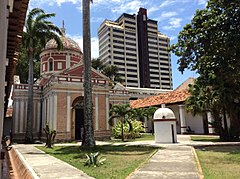
Chapel San Miguel.
Barquisimeto is located on the terrace of the same name, on the banks of the Turbio River, 622 metres (2,040 feet) above sea level and a population of 930,000 inhabitants.[1] It has a location on the central western of Venezuela (363 km (226 mi) from Caracas, the country's capital city), being a point of convergence of many of the major land routes and rail, characterized also by its street order and appropriate signage due to the location of the city with a relief almost completely flat, which facilitated the distribution of the urban grid and with the streets numbered in ascending numerical order, factors that help the foreign citizen and easily locate addresses. Its climate is pleasant in the months of December to March, with an average temperature of 26 °C (79 °F) throughout the year.
Neighboring municipalities
North: Urdaneta Municipality
South: Palavecino Municipality
East: Peña Municipality, Yaracuy State
West: Jiménez and Torres Municipalities.
Large-magnitude earthquakes (Richter’s scale)
- 6.6 (8/3/1950)
- 5.6 (3/5/1975)
- 6.3 (9/12/2009)
Climate

Panoramic view of Baquisimeto.

Barquisimeto at night.
In the city, a hot semi-arid climate (Köppen BSh) is dominant. Located in that region, Barquisimeto records 550 millimetres or 21.7 inches of rain per year and its average temperature ranges 25 °C (77 °F). However, in higher regions near the Andes, temperatures are lower and the rain is more constant. For instance, in Sanare city, the annual average rainfall is 835 millimetres or 32.9 inches.
| Month | Jan | Feb | Mar | Apr | May | Jun | Jul | Aug | Sep | Oct | Nov | Dec | Year |
|---|---|---|---|---|---|---|---|---|---|---|---|---|---|
| Record high °C (°F) | 33.9 (93) | 35.4 (95.7) | 37.5 (99.5) | 35.6 (96.1) | 35.6 (96.1) | 34.0 (93.2) | 32.8 (91) | 33.8 (92.8) | 34.0 (93.2) | 34.1 (93.4) | 33.6 (92.5) | 32.8 (91) | 37.5 (99.5) |
| Average high °C (°F) | 29.5 (85.1) | 30.3 (86.5) | 31.1 (88) | 30.4 (86.7) | 29.6 (85.3) | 28.9 (84) | 28.8 (83.8) | 29.7 (85.5) | 30.2 (86.4) | 30.2 (86.4) | 29.8 (85.6) | 29.1 (84.4) | 29.8 (85.6) |
| Daily mean °C (°F) | 24.1 (75.4) | 24.7 (76.5) | 25.4 (77.7) | 25.5 (77.9) | 25.1 (77.2) | 24.6 (76.3) | 24.3 (75.7) | 24.8 (76.6) | 25.2 (77.4) | 25.2 (77.4) | 24.9 (76.8) | 24.1 (75.4) | 24.8 (76.6) |
| Average low °C (°F) | 18.6 (65.5) | 19.0 (66.2) | 19.6 (67.3) | 20.6 (69.1) | 20.6 (69.1) | 20.2 (68.4) | 19.8 (67.6) | 19.9 (67.8) | 20.1 (68.2) | 20.2 (68.4) | 20.0 (68) | 19.1 (66.4) | 19.8 (67.6) |
| Record low °C (°F) | 13.4 (56.1) | 13.2 (55.8) | 12.6 (54.7) | 15.2 (59.4) | 16.5 (61.7) | 16.1 (61) | 16.4 (61.5) | 15.4 (59.7) | 15.4 (59.7) | 15.1 (59.2) | 15.0 (59) | 13.8 (56.8) | 12.6 (54.7) |
| Average rainfall mm (inches) | 9 (0.4) | 8 (0.3) | 14 (0.6) | 65 (2.6) | 75 (3) | 78 (3.1) | 77 (3) | 53 (2.1) | 39 (1.5) | 49 (1.9) | 48 (1.9) | 25 (1) | 540 (21.3) |
| Average rainy days (≥ 1.0 mm) | 1.5 | 1.2 | 1.7 | 5.5 | 7.9 | 12.0 | 10.6 | 8.1 | 5.8 | 6.1 | 6.4 | 4.0 | 70.8 |
| Average relative humidity (%) | 68.5 | 66.5 | 65.5 | 70.0 | 74.0 | 75.0 | 74.5 | 73.0 | 72.5 | 73.0 | 73.0 | 72.0 | 71.5 |
| Mean monthly sunshine hours | 260.4 | 235.2 | 241.8 | 183.0 | 192.2 | 201.0 | 232.5 | 241.8 | 228.0 | 226.3 | 222.0 | 248.0 | 2,712.2 |
| Source #1: Instituto Nacional de Meteorología e Hidrología (INAMEH)[2][3] | |||||||||||||
| Source #2: NOAA (extremes, precipitation, and sun)[4] | |||||||||||||
Education

Mosaic Rectorate of the Universidad Centroccidental Lisandro Alvarado.

Nuestra Señora de la Paz Sanctuary.
Barquisimeto is a city with a historic vocation by academic knowledge, and boasts a considerable sample of universities and institutes of higher education in Venezuela, has a high and growing student population from all over the country.
Major universities in the city include Universidad Centroccidental Lisandro Alvarado and Universidad Nacional Experimental Politécnica Antonio José de Sucre.
Other universities and colleges
- Public institutions
- National Polytechnic Experimental University Antonio José de Sucre (UNEXPO)
- Libertador's Experimental and Pedagogical University (UPEL)
- Andrés Eloy Blanco's Territorial and Polytechnic of Lara University (IUETAEB - former Andrés Eloy Blanco's Experimental and Technology Institute)
- National Open University (UNA)
Simón Rodríguez's National Experimental University (UNESR)
Central University of Venezuela (UCV - Barquisimeto's Regional Center)
Bolivarian University of Venezuela (UBV)
National Experimental University of the Armed Forces (UNEFA)
- Private institutions
- Fermin Toro University (UFT)
- Yacambú University (UNY)
- Fermin Toro College (CUFT)
- Rodolfo Loero Arismendi Technology and Industrial Institute (IUTIRLA)
- National Institute of Socialist Education and Capacitation (INCES)
- Antonio José de Sucre Technology Institute (IUTAJS)
- Jesús Obrero Institute (IUJO)
Hospitals

C.C Sambil Barquisimeto.

La Flor de Venezuela.
Private hospitals
- Clínica IDB Barquisimeto
Address: Carrera 19 esquina calle 34
- Clínica Razetti de Barquisimeto
Address: Carrera 21
- Policlínica Barquisimeto
Address: Av. Lara (paseo Los Leones y calle Madrid)
- Previmédica IDB Los Abogados
Address: Av. Los Abogados (calles 16 y 17). 50 mts. from Av. Vargas
- Previmédica IDB Centro
Address: Calle 34 (carreras 19 y 20)
- Previmédica IDB Oeste
Address: Av. Pedro León Torres (calle 59). CC Sotavento
Public hospitals
- Hospital Central Universitario Antonio María Pineda
Address: Av. Libertador
- Hospital Dr. Luis Gómez López
Address: Barrio La Feria
Gallery Images
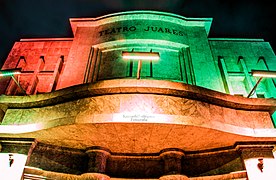
Juares Theater

Barquisimeto Cathedral Inside
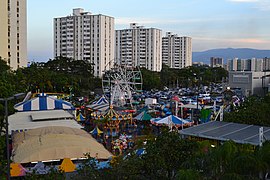
Barquisimeto East
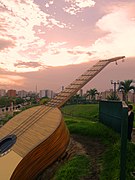
Cuatro of Barquisimeto
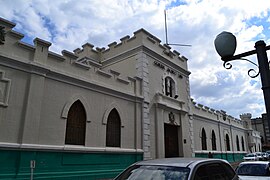
Barracks General Jacinto Lara

Lagoon in Zoo Park of Barquisimeto
Obelisk of Barquisimeto

La Tinaja

Santa Rosa Church
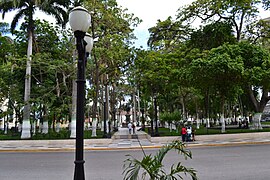
Bolívar Square
Transportation
The Transbarca system is a new "bus rapid transit" (BRT) system under construction, which was originally planned to use trolleybuses. When construction began, in 2006, the system was projected to serve an average of 170,000 people per day when completed, using 80 trolleybuses operating along 30 km (19 mi) of exclusive lanes, across the metropolitan area. Service was planned to include an express route of 22 km (14 mi) along with one local route of 8 km (5 mi). With 52 stations, the BRT system is to include a centralized system of communication and security, and structures for easy access for elderly and disabled people. It is to be complemented with feeder routes, covering the areas of Greater Barquisimeto the BRT line will not serve, which will connect with the main line at terminal stations.
Although 80 articulated trolleybuses were purchased from Neoplan and delivered around 2008–09,[5] the plans to operate the Transbarca system with those vehicles were dropped in 2013.[6] In addition to reasons of cost, an inadequate supply of electricity with which to power the system was cited in the announcement of the decision.[7]
- Buses are the main means of mass transportation. The system runs a variety of bus types, operated by several companies on normal streets and avenues:
bus; large buses.
buseta; medium-sized buses.
microbus or colectivo; vans or minivans.
rapiditos; old cars with capacity for 5 or more people.
The airport is called Jacinto Lara International Airport.
Sports

View of the Antonio Herrera Gutiérrez Baseball Stadium
The city is home to several notable baseball and football teams. Several other sports also have Barquisimeto as their home.
Cardenales de Lara (English: Lara Cardinals) (Venezuelan Professional Baseball League)
Guaros de Lara (Venezuelan Professional Basketball League)
Notable People
Carlos Mendoza - baseball coach
Junior Alvarado - Thoroughbred racing jockey
Carla Rodrigues - Venezuelan-Portuguese model and Miss República Portuguesa 2018
See also
- Venezuela
- Lara state
- List of cities in Venezuela
- List of wine-producing regions
- Railway stations in Venezuela
- Gustavo Dudamel
References
^ ab "Built-up urban areas by land area (urban footprint)" (PDF). Demographia. December 2016. Retrieved 4 June 2017..mw-parser-output cite.citation{font-style:inherit}.mw-parser-output q{quotes:"""""""'""'"}.mw-parser-output code.cs1-code{color:inherit;background:inherit;border:inherit;padding:inherit}.mw-parser-output .cs1-lock-free a{background:url("//upload.wikimedia.org/wikipedia/commons/thumb/6/65/Lock-green.svg/9px-Lock-green.svg.png")no-repeat;background-position:right .1em center}.mw-parser-output .cs1-lock-limited a,.mw-parser-output .cs1-lock-registration a{background:url("//upload.wikimedia.org/wikipedia/commons/thumb/d/d6/Lock-gray-alt-2.svg/9px-Lock-gray-alt-2.svg.png")no-repeat;background-position:right .1em center}.mw-parser-output .cs1-lock-subscription a{background:url("//upload.wikimedia.org/wikipedia/commons/thumb/a/aa/Lock-red-alt-2.svg/9px-Lock-red-alt-2.svg.png")no-repeat;background-position:right .1em center}.mw-parser-output .cs1-subscription,.mw-parser-output .cs1-registration{color:#555}.mw-parser-output .cs1-subscription span,.mw-parser-output .cs1-registration span{border-bottom:1px dotted;cursor:help}.mw-parser-output .cs1-hidden-error{display:none;font-size:100%}.mw-parser-output .cs1-visible-error{font-size:100%}.mw-parser-output .cs1-subscription,.mw-parser-output .cs1-registration,.mw-parser-output .cs1-format{font-size:95%}.mw-parser-output .cs1-kern-left,.mw-parser-output .cs1-kern-wl-left{padding-left:0.2em}.mw-parser-output .cs1-kern-right,.mw-parser-output .cs1-kern-wl-right{padding-right:0.2em}
^ "Estadísticos Básicos Temperaturas y Humedades Relativas Máximas y Mínimas Medias" (PDF). INAMEH (in Spanish). Archived from the original (pdf) on 15 June 2013. Retrieved 29 October 2012.
^ "Estadísticos Básicos Temperaturas y Humedades Relativas Medias" (PDF). INAMEH (in Spanish). Archived from the original (pdf) on 15 June 2013. Retrieved 29 October 2012.
^ "Barquisimeto Climate Normals 1961–1990". National Oceanic and Atmospheric Administration. Retrieved 12 August 2015.
^ Trolleybus Magazine No. 306 (November–December 2012), p. 148.
^ Trolleybus Magazine No. 311 (September–October 2013), p. 138.
^ Pérez Terán, Daniel (5 July 2013). "Ministro El Troudi: Transbarca debe estar terminado el 14-S" [Minister El Troudi: Transbarca must be completed on 14-S (14 September)]. El Impulso (in Spanish). Retrieved 9 August 2015.
External links
| Wikimedia Commons has media related to Barquisimeto. |
Wikisource has the text of the 1911 Encyclopædia Britannica article Barquisimeto, Venezuela. |
- LaraTurismo, WebGuide of Tourism in Lara
- Barquisimeto.com
- MiBarquisimeto, Dedicado a Barquisimeto
- Check the weather in Barquisimeto now
- Nuevo Sistema Ferroviario de Venezuela
- Video Footage of Barquisimeto and some of its places
- Barquisimeto, Bitacora de una Ciudad
- Venezuela Tuya, Barquisimeto
- Discover Venezuela, Barquisimeto
- Museo de Barquisimeto











